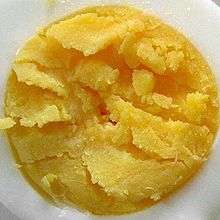Cookbook:Hard Boiled Eggs
Cookbook | Ingredients | Recipes
| Breakfast

Inside a hard-boiled egg
Ingredients
Warnings
- Unwashed eggs will keep 4-5 weeks in the coldest part of the refrigerator
- Boiled or washed eggs will only keep about a week-the protective cover over the shell is gone.
- Look at your eggs BEFORE you put them in your grocery cart! Never buy cracked or even dirty eggs.
- Hard-boiled eggs left out too long should not be eaten, i.e., hard-boiled Easter eggs should not be eaten unless the contents of the egg are blown out and cooked separately.
Procedure
- Put the eggs in a pot.
- Fill pot with water. Make sure that the tops of the eggs are covered by at least 25 mm (one inch).
- Bring to a rolling boil.
- Reduce heat to a low boil.
- Cook for 10 to 15 minutes -- depending on the size and number of eggs.
- Drain the pot.
- Cool eggs immediately by running cold water over them or putting in iced water.
- Crack and peel the eggs under very cold running water, starting by cracking the large (air pocket) end, then taking off the largest pieces first.
Lowering the eggs' temperature keeps the shells from sticking, and prevents the greenish tinge sometimes seen on hard-boiled eggs. (The greenish tinge doesn't affect taste or safety, and does not indicate decay or toxicity. Instead, it is due to the reaction between iron and sulphur from the egg white and yolk.)
Tips, Notes, and Variations
- An alternate method is to turn off the heat, cover the pot, and let stand 15 or 18 minutes.
- Salt in the water can help keep egg white from seeping out of a crack.
- Multiple layers of eggs in the pot are more likely to crack: use only a single layer and do another batch.
- Older eggs will be easier to peel, as the air space is larger.
- If the peeling becomes tragic, you can always make egg salad or bird food!
This article is issued from Wikibooks. The text is licensed under Creative Commons - Attribution - Sharealike. Additional terms may apply for the media files.